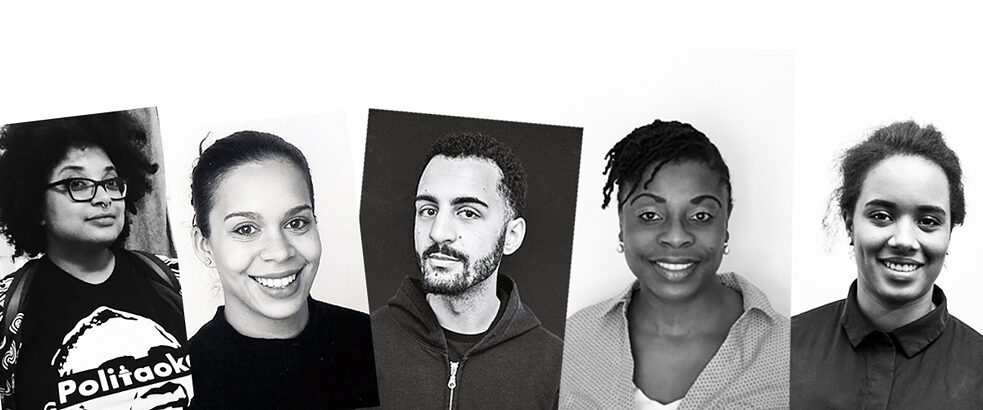Black Lives Matter: A Transatlantic Discussion about the Movement in the German Context

© Goethe-Institut / Wood Powell
Recent protests, which began in Minneapolis, Minnesota, have spread across the globe, even to cities in Germany, where many are rallying behind the "Black Lives Matter" movement to call for a deeper examination of systemic racial injustice in their own society.
The Transatlantic Outreach Program (TOP) and the Goethe-Institut Visitors Programme invite you to a panel discussion with representatives from the United States and Germany to discuss such questions as:
- What are the historical backgrounds of Black people in Germany?
- In what ways have they been accepted or not into German society?
- What are the historical backgrounds of racism in Germany and of racism towards Black people in particular?
- What efforts have been made in Germany, both from the side of the government and society at large, to discuss the issues of racism, discrimination, and decolonization?
- What are the similarities and differences between anti-racism movements in Germany and those in the U.S.?
- What does the future of the "Black Lives Matter" movement look like in Germany?
Panelists include:
- Diana Arce: An Alaskan-born Dominican who lives and works in Berlin, Germany. Diana has a BA in Cultural Studies and Experimental Film from Hampshire College in Amherst, Massachusetts and an MFA in Art in Context from the University of Arts, Berlin, Germany. She also hold degrees from the Academy of Rebellion and School for Creative Activism. Diana is the founder of Artist Without a Cause, a non-profit that develops collaborations between activist-artists and social justice groups. Diana has discussed her work on NPR, BBC Outlook, Deutschland Radiokultur and ARD and has been featured in Comedy Central’s Indecision 2008, Metro New York, The New Amsterdam News and the German publication IQ Style.
- Melanie Bey: An American-born "military brat" of an African-American father and German mother who is currently an 8th grade teacher at the Jakob-Stoll-Schule in Würzburg, Bavaria.
- F. Angelo Camufingo: Angelo Camufingo is a German/Angolan activist, Diversity and Inclusion Consultant and awareness trainer. He is also one of the heads of the anti-racism division of the students’ committee at the University of Potsdam. While completing his Master’s Degree of Education in English and French, Angelo is currently researching the development of transcultural discourses in German school curricula, knowledge hierarchies and auto-ethnographic work on power structures and racist continuities.
- Dr. Tiffany Florvil: An Associate Professor of 20th-Century European Women’s and Gender History at the University of New Mexico, where she specializes in the histories of post-1945 Germany, the African diaspora, gender and sexuality, and emotions. She received her PhD from the University of South Carolina in Modern European History and her MA from the University of Wisconsin-Madison in European Women’s and Gender History. She is the Co-Founder and Co-Chair of the Black Diaspora Studies Network at the German Studies Association; the Co-Founder and Network Editor of H-Emotions; an Advisory Board Member, a Network Editor, and Co-Founder of H-Black Europe; and member of the Black Central Europe. Florvil has received fellowships from the American Council on Germany, German Academic Exchange Service (DAAD), and others. She has presented at conferences in the United States, Great Britain, Canada, and Germany.
- Anna Yeboah: Architect and coordinator of the Dekoloniale Project: Memory Culture in the City. Between now and the end of 2024, the pilot project DEKOLONIALE_Memory Culture in the City will develop a transnational cartography and organize exhibitions, an annual cultural festival, interventions and think tanks in all districts of the city of Berlin. The program addresses local colonial and resistance histories and deals with their repercussions on our globalized present.
- Born into a German-Cuban family, Boris Abel studied political science at the Institut d’études politiques (IEP) in Paris, at the University of Kent in Canterbury (GB) and at the Free University of Berlin. From 1996 to 1999 ha was co-director of the artist project space Kunstruimte Berlin. From 2000 to 2011 he headed the gallery ABEL Neue Kunst in Berlin. Today he works as a seminar leader and liaison/educational officer, among others, for the Goethe-Institut Berlin and the Foundation Memorial to the Murdered Jews of Europe as well as a freelance curator and author.
- Sophie Eliot was born in France and is based in Berlin since 2000. After studying German studies (France) as well as arts management and cultural work at the University of Applied Sciences Potsdam (Germany), she is currently finishing her PhD thesis about curatorial practices and discourses in the field of contemporary African art at the University of Oldenburg (Germany). Furthermore she completed training courses in anti-racist cultural work. As a freelance author she published a.o. for ContemporaryAnd and Cahiers d'études africaines. She works as freelance cultural mediator for Berliner museums. In this context she developed critical guided tours about colonialism and racism for the exhibition "Beyond Compare: Art form Africa at the Bode-Museum". She also works as a liaison officer for the Goethe-Institut.
Date: Thursday, July 16, 2020
Start Time: 11:00 AM EDT / 17:00 CET
End Time: 12:30 PM EDT / 18:30 CET
WEBINAR RELATED CONTENT (some password protected content)
 Webinar Recording
Webinar Recording